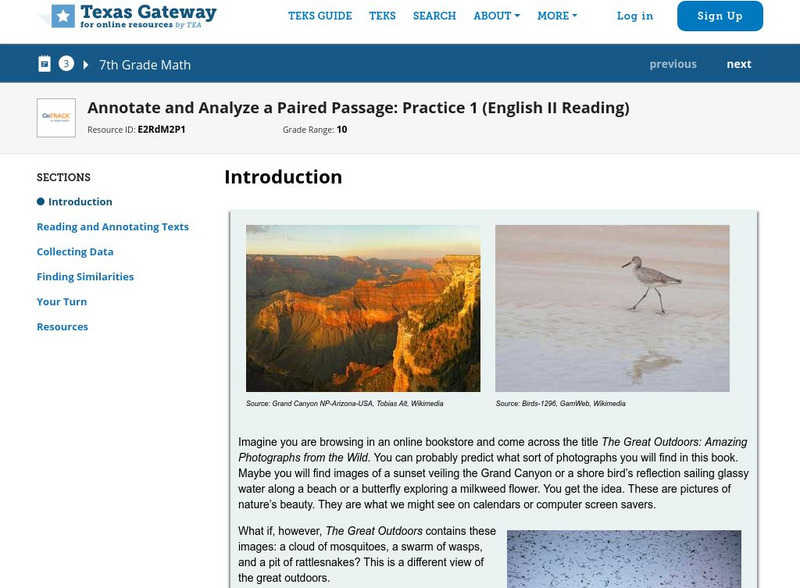Hi, what do you want to do?
Curated OER
Lab Report Template
Pupils write a paragraph (complete sentences) which explains what they did in the lab.
Curated OER
Underground Railroad
Fourth graders use internet cites to explore the Underground Railroad. They also learn the importance of the Emancipation Proclamation. Focus questions are included.
Curated OER
Design a Better Classroom Workplace
Students design a new classroom workplace. In this architecture lesson, students use area formulas to identify the problem with the existing desks in their classroom. Students design their own solution volume formulas to solve the...
Curated OER
Two Column Logic Proofs
Students complete two column proofs. For this geometry lesson,students derive the reasons their answers are correct using logic. They write the proof step by step using two columns.
Curated OER
Surrender at Yorktown
Eighth graders examine the start of the American Revolution. In this American History lesson plan, 8th graders analyze primary sources. Students prepare a narration of events leading up to the revolution.
Curated OER
Weather Forecasting: From Then to Now
Eighth graders review the history of weather forecasting. In this earth science lesson, 8th graders identify the different tools used in forecasting weather. They explain why it's important to know the weather.
Curated OER
Using Newsprint as a UV Detector
Young scholars investigate the effects of UV radiation. In this earth science lesson, students explain how the time of day relate to UV abundance on Earth. They determine if weather affects the amount of UV that Earth receives.
Curated OER
RADIATION PROTECTION: HOW MUCH IS ENOUGH?
Students study the effects of shielding on the amount of detectable radioactivity from a gamma source. They investigate the shielding of one type of metal, then design their own experiments to answer questions raised during the...
Curated OER
A Treasure at our Doorstep
Students write a descriptive essay about a historical landmark in their area, such as the Curtis Center in Philadelphia, PA. In this historical landmarks instructional activity, students use their senses to detail information about the...
Curated OER
What Are The Chances
Students calculate the probability of an event occurring. In this probability lesson, students differentiate between independent, dependent or compound events. They find the range of the data.
Curated OER
Probability: Playing with Fire
Students use probability to determine how likely it is for each tree in a small forest to catch on fire.
Curated OER
Mississippi’s Electricity: From Generation to Consumption
Eighth graders discover how electricity is produced. In this physics lesson plan, 8th graders infer about the future of Mississippi's energy industry. They participate in a Smart Board interactive activity at the end of the lesson plan.
Curated OER
Inner Space Cavern Cave Field Activity: Drip Rate Analysis
Young scholars compare drip rates at several different locations throughout a cave. They observe, first hand, the heterogeneity in flow paths present in karst aquifers such as the Edwards aquifer.
Curated OER
Using PING to determine factors of Internet delay
Students use the concepts of PING to examine Internet delay. They discuss why PING is used in the Computer Science industry. They practice interpreting data as well.
Curated OER
Earth Day Trash Survey Unit
Students analyze the data from questionnaires to prepare a report. They distribute the report via e-mail or through a report published on a Web page to those who participated.
Curated OER
Investigation of Pot Sherds
Fourth graders review their prior knowledge on the concept of pi. Using broken pieces of pottery, they calculate the circumference from a section of the circle. In teams, they compete against one another to get the most accurate...
Curated OER
Cycles Review
Eighth graders discuss the four major cycles of matter. In this general science lesson plan, 8th graders decide which of the four is the most important. They share their opinion in class.
Curated OER
Introduction to Biomes
Eighth graders identify the different kinds of biomes. In this life science lesson, 8th graders explain their importance in an ecosystem. They take a BrainPop quiz at the end of the lesson..
Curated OER
Hazard Mitigation: Bioterrorism
Students discuss different ways to spread infectious diseases. In this bioterrorism activity, students model the rate of smoke emission using CalRoad software. They analyze the effects of airborne release of...
Texas Education Agency
Texas Gateway: Annotate and Analyze a Paired Passage: Practice 1
In this lesson, students will read and annotate a pair of texts to make inferences, draw conclusions, and synthesize ideas and details using textual evidence.
Texas Education Agency
Texas Gateway: Annotate and Analyze a Paired Passage: Practice 2
[Accessible by TX Educators. Free Registration/Login Required] In this lesson, students will read and annotate a pair of texts to make inferences, draw conclusions, and synthesize ideas and details using textual evidence.
Texas Education Agency
Texas Gateway: Annotate and Analyze a Paired Passage: Practice 1
In this lesson, students will read and annotate a pair of texts to make inferences, draw conclusions, and synthesize ideas and details using textual evidence. The two texts are side-by-side to better understand them.
Texas Education Agency
Texas Gateway: Annotate and Analyze a Paired Passage: Practice 1
Read and annotate paired texts in order to make inferences, draw conclusions, and synthesize ideas and details using textual evidence.




























